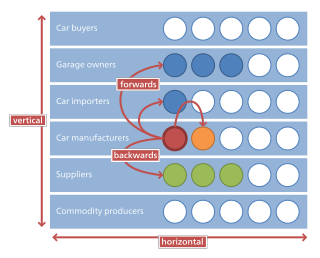See also
- ↑ "Archived copy". Archived from the original on 2023-08-28. Retrieved 2023-08-28.
{{cite web}}: CS1 maint: archived copy as title (link)
A pay grade is a unit in systems of monetary compensation for employment. It is commonly used in public service, both civil and military, but also for companies of the private sector. Pay grades facilitate the employment process by providing a fixed framework of salary ranges, as opposed to a free negotiation. Typically, pay grades encompass two dimensions: a “vertical” range where each level corresponds to the responsibility of, and requirements needed for a certain position; and a “horizontal” range within this scale to allow for monetary incentives rewarding the employee's quality of performance or length of service. Thus, an employee progresses within the horizontal and vertical ranges upon achieving positive appraisal on a regular basis. In most cases, evaluation is done annually and encompasses more than one method.
Important employers to use pay grades include:
The expression "beyond my pay grade" means that the question is one the respondent is not qualified or authorised to answer, that it must be referred to a higher (or better paid) authority for a definitive response.
Iranian Women have 4x lower paygrade. [1]
{{cite web}}: CS1 maint: archived copy as title (link)
The Legion of Merit (LOM) is a military award of the United States Armed Forces that is given for exceptionally meritorious conduct in the performance of outstanding services and achievements. The decoration is issued to members of the eight uniformed services of the United States as well as to military and political figures of foreign governments.

The United States Air Force (USAF) is the air service branch of the United States Armed Forces, and is one of the eight uniformed services of the United States. Originally created on 1 August 1907, as a part of the United States Army Signal Corps, the USAF was established as a separate branch of the United States Armed Forces in 1947 with the enactment of the National Security Act of 1947. It is the second youngest branch of the United States Armed Forces and the fourth in order of precedence. The United States Air Force articulates its core missions as air supremacy, global integrated intelligence, surveillance and reconnaissance, rapid global mobility, global strike, and command and control.

Quid pro quo is a Latin phrase used in English to mean an exchange of goods or services, in which one transfer is contingent upon the other; "a favor for a favor". Phrases with similar meanings include: "give and take", "tit for tat", "you scratch my back, and I'll scratch yours", and "one hand washes the other". Other languages use other phrases for the same purpose.

Horizontal integration is the process of a company increasing production of goods or services at the same level of the value chain, in the same industry. A company may do this via internal expansion, acquisition or merger.

Temporary work or temporary employment refers to an employment situation where the working arrangement is limited to a certain period of time based on the needs of the employing organization. Temporary employees are sometimes called "contractual", "seasonal", "interim", "casual staff", "outsourcing", "freelance"; or the words may be shortened to "temps". In some instances, temporary, highly skilled professionals refer to themselves as consultants. Increasingly, executive-level positions are also filled with interim executives or fractional executives.
A pre-entry closed shop is a form of union security agreement under which the employer agrees to hire union members only, and employees must remain members of the union at all times to remain employed. This is different from a post-entry closed shop, which is an agreement requiring all employees to join the union if they are not already members. In a union shop, the union must accept as a member any person hired by the employer. By comparison, an open shop does not require union membership of potential and current employees.
Equal pay for equal work is the concept of labour rights that individuals in the same workplace be given equal pay. It is most commonly used in the context of sexual discrimination, in relation to the gender pay gap. Equal pay relates to the full range of payments and benefits, including basic pay, non-salary payments, bonuses and allowances. Some countries have moved faster than others in addressing equal pay.

The Meritorious Service Medal (MSM) is a military award presented to members of the United States Armed Forces who distinguished themselves by outstanding meritorious achievement or service to the United States subsequent to January 16, 1969.

The Age Discrimination in Employment Act of 1967 is a United States labor law that forbids employment discrimination against anyone, at least 40 years of age, in the United States. In 1967, the bill was signed into law by President Lyndon B. Johnson. The ADEA prevents age discrimination and provides equal employment opportunity under the conditions that were not explicitly covered in Title VII of the Civil Rights Act of 1964. The act also applies to the standards for pensions and benefits provided by employers, and requires that information concerning the needs of older workers be provided to the general public.

The Senior Executive Service (SES) is a position classification in the civil service of the United States federal government equivalent to general officer or flag officer rank in the U.S. Armed Forces. It was created in 1979 when the Civil Service Reform Act of 1978 went into effect under President Jimmy Carter.
The General Schedule (GS) is the predominant pay scale within the United States civil service. The GS includes the majority of white collar personnel positions. As of September 2004, 71 percent of federal civilian employees were paid under the GS. The GG pay rates are identical to published GS pay rates.
A severance package is pay and benefits that employees may be entitled to receive when they leave employment at a company unwillfully. In addition to their remaining regular pay, it may include some of the following:
The United States federal civil service is the civilian workforce of the United States federal government's departments and agencies. The federal civil service was established in 1871. U.S. state and local government entities often have comparable civil service systems that are modeled on the national system to varying degrees.
Employment discrimination law in the United States derives from the common law, and is codified in numerous state, federal, and local laws. These laws prohibit discrimination based on certain characteristics or "protected categories." The United States Constitution also prohibits discrimination by federal and state governments against their public employees. Discrimination in the private sector is not directly constrained by the Constitution, but has become subject to a growing body of federal and state law, including the Title VII of the Civil Rights Act of 1964. Federal law prohibits discrimination in a number of areas, including recruiting, hiring, job evaluations, promotion policies, training, compensation and disciplinary action. State laws often extend protection to additional categories or employers.

The economy of Kosovo is a transition economy. Kosovo was the poorest province of the former Yugoslavia with a modern economy established only after a series of federal development subsidies in the 1960s and the 1970s.

E-Verify is a United States Department of Homeland Security (DHS) website that allows businesses to determine the eligibility of their employees, both U.S. and foreign citizens, to work in the United States. The site was originally established in 1996 as the Basic Pilot Program to prevent companies from hiring people who had violated immigration laws and entered the United States illegally. In August 2007, the DHS started requiring all federal contractors and vendors to use E-Verify. The Internet-based program is free and maintained by the United States government. While federal law does not mandate use of E-Verify for non-federal employees, some states have mandated use of E-Verify or similar programs, while others have discouraged the program.

The Fair Labor Standards Act of 1938 29 U.S.C. § 203 (FLSA) is a United States labor law that creates the right to a minimum wage, and "time-and-a-half" overtime pay when people work over forty hours a week. It also prohibits employment of minors in "oppressive child labor". It applies to employees engaged in interstate commerce or employed by an enterprise engaged in commerce or in the production of goods for commerce, unless the employer can claim an exemption from coverage. The Act was enacted by the 75th Congress and signed into law by President Franklin D. Roosevelt in 1938.

The Social Research and Demonstration Corporation (SRDC) is an independent non-profit and non-partisan social policy research organization based in Canada, with a focus on designing, implementing and evaluating large-scale demonstration projects.
In law, wrongful dismissal, also called wrongful termination or wrongful discharge, is a situation in which an employee's contract of employment has been terminated by the employer, where the termination breaches one or more terms of the contract of employment, or a statute provision or rule in employment law. Laws governing wrongful dismissal vary according to the terms of the employment contract, as well as under the laws and public policies of the jurisdiction.

The Joint Polarization Experiment (JPOLE) was a test for evaluating the performance of the WSR-88D in order to modify it to include dual polarization. This program was a joint project of the National Weather Service (NWS), the Federal Aviation Administration (FAA), and the US Air Force Meteorological Agency (AFWA), which took place from 2000-2004. It has resulted in the upgrading of the entire meteorological radar network in the United States by adding dual polarization to better determine the type of hydrometeor, and quantities that have fallen.